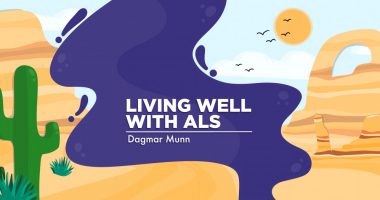Teaching and Learning About ALS Life

I’m always eager to help others improve their understanding of what it’s like to live with amyotrophic lateral sclerosis (ALS). Likewise, I enjoy learning more about what others in the ALS community think and feel about living with the condition. Recently, I had the opportunity to satisfy both interests and want to share them with you.
Sneak peek at a new app
I was invited to participate in a user-friendliness test for a new app and give feedback on how helpful it might be for patients with ALS. The test was conducted on my computer via Zoom, where the developer could follow my selections in real-time and ask my opinion at each step. While the tests were easy for me to do, along the way I did give the developer several aha! moments, shedding light on what an ALS patient can and cannot do.
For example, my first task was to send a message to my caregiver that I had a headache. I could choose to communicate using a voice assistant or a one-click menu. We quickly determined the voice assistant didn’t understand my ALS-affected voice, so I searched the colorful graphics and found one indicating pain. After clicking it, I was prompted to choose a body part and easily found “head.” Clicking that produced a message: “Success! You have sent a message to your caregiver.”
During our discussion, I pointed out that although I thought it was great to message my caregiver, it would be even better to know my caregiver actually read it and was responding. I’d appreciate a response such as, “I’m on my way,” or, “I’ll be with you as soon as I can.” Otherwise, I might feel anxious and resend the message multiple times. The developer agreed, admitting that she hadn’t thought about how a reply to the message would complete the circle of communication.
My second test was to reach out to a friend or family member. Again, the voice assistant was of no help. I searched in vain for a clickable graphic or icon. “How about just texting your friend?” the developer hinted. “Um, do you have 20 minutes?” I asked with a chuckle.
I explained that my ALS-affected fingers can’t do the double-handed, two-thumbed rapid typing that texting on a mobile phone requires. I’ve even written about it, I noted. When my daughter sends me a text, for example, I’m so slow with my one-finger typing that before I can finish my reply, she has sent two more comments and is on to a whole new topic.
During our discussion, the developer noted that she had assumed most ALS patients carry cellphones and had the voice or finger dexterity to operate them.
Following our online meeting, I thought about the continuing challenges we face in breaking the stereotypes of ALS that people have, as well as increasing awareness about what ALS is. Good thing we have ALS Awareness Month coming up next month.
A revealing survey
In February, ALS News Today reported the results of an online survey that I found very interesting. Of the 290 U.S. residents who completed the survey, over two-thirds (200) of them were people living with ALS or answering on behalf of someone with the disease.
What I didn’t find surprising was that more than half of the respondents with ALS are dissatisfied with their quality of life and pessimistic about the future. This reflects what I’ve read in comments from members of ALS-related Facebook groups and newly diagnosed patients joining our ALS News Today Forums.
Only 10.3% of survey respondents were “very satisfied” with their quality of life. I was one of those 10 percenters, which I believe reflects my mindset that I can be happy and healthy despite living with ALS.
I figure it points to how my motivation and wellness tips are still needed. I’ll keep on sharing and encouraging my readers to learn how to live well while living with ALS.
Note: ALS News Today is strictly a news and information website about the disease. It does not provide medical advice, diagnosis, or treatment. This content is not intended to be a substitute for professional medical advice, diagnosis, or treatment. Always seek the advice of your physician or other qualified health provider with any questions you may have regarding a medical condition. Never disregard professional medical advice or delay in seeking it because of something you have read on this website. The opinions expressed in this column are not those of ALS News Today or its parent company, BioNews, and are intended to spark discussion about issues pertaining to ALS.








Comments